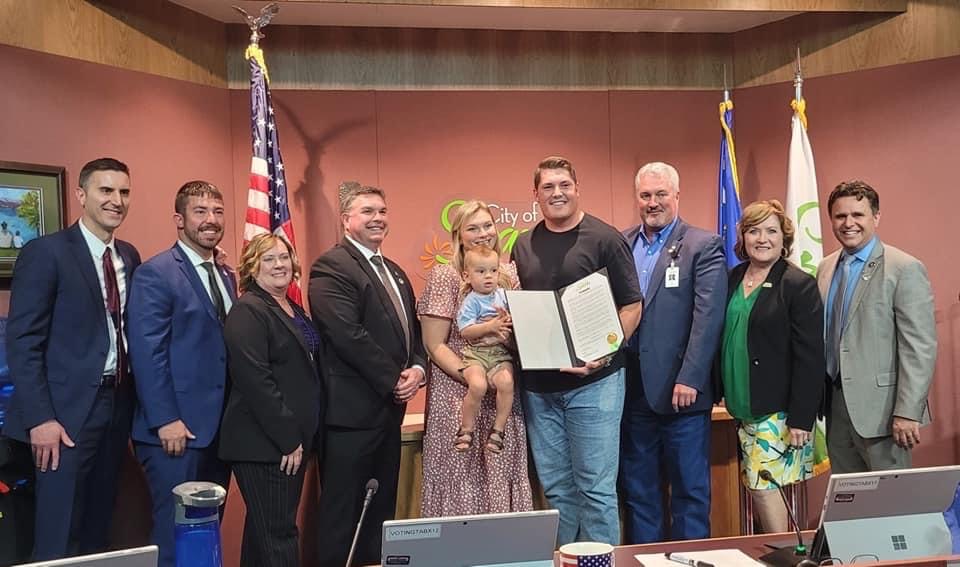
- Details
- By Darren Thompson
On Monday, the City of Sparks, Nevada dedicated April 25, 2022 as Austin Corbett Day. Austin Corbett is a citizen of the Walker River Paiute Tribe in Schurz, Nevada, and a former starting offensive guard for the Los Angeles Rams–the team that won Super Bowl LVI earlier this year.
“The City of Sparks is thankful to have an Austin Corbett representing our city and community at the highest level of professional football,” said Mayor of the City of Sparks Ed Lawson in the Austin Corbett Proclamation yesterday. “We congratulate Austin on this amazing accomplishment and wish him many more successful seasons in the National Football League (NFL). We also wish him the best of luck this upcoming season with the Carolina Panthers.”
Corbett was born and raised in the City of Sparks, and started playing football in Sparks Pop Warner leagues at the age of 7. He graduated from the Edward C. Reed High School in 2013 and earned varsity sports letters in baseball, basketball, football, track and field, and wrestling. He walked on the University of Nevada—Reno (UNR) football team in 2013 and started in 48 consecutive games.
Corbett was the 33rd draft in the 2018 NFL Draft and the first athlete to start in the Super Bowl from the Reno-Sparks region. He spent a season with the Cleveland Browns and was traded to the Rams in 2019.
“On behalf of the Walker River Paiute Tribe and our community, it is my honor and pleasure to congratulate our Tribal member on all his amazing accomplishments in his career and his personal life,” said Walker River Paiute Tribal Chairman Amber Torres in a statement. “We are here to celebrate you Austin, support you and uplift you on your new adventures ahead in life. You have set an outstanding example for our native youth across Indian [C]ountry to set their goals, and go after them.”
Post-Super Bowl win, Corbett was traded again and signed a three-year contract with the Carolina Panthers.
Tell Us What You Think
More Stories Like This
Chickasaw Holiday Art Market Returns to Sulphur on Dec. 6Center for Native Futures Hosts Third Mound Summit on Contemporary Native Arts
Filmmakers Defend ‘You’re No Indian’ After Demand to Halt Screenings
A Native American Heritage Month Playlist You Can Listen to All Year Long
11 Native Actors You Should Know
Help us defend tribal sovereignty.
At Native News Online, our mission is rooted in telling the stories that strengthen sovereignty and uplift Indigenous voices — not just at year’s end, but every single day.
Because of your generosity last year, we were able to keep our reporters on the ground in tribal communities, at national gatherings and in the halls of Congress — covering the issues that matter most to Indian Country: sovereignty, culture, education, health and economic opportunity.
That support sustained us through a tough year in 2025. Now, as we look to the year ahead, we need your help right now to ensure warrior journalism remains strong — reporting that defends tribal sovereignty, amplifies Native truth, and holds power accountable.
 The stakes couldn't be higher. Your support keeps Native voices heard, Native stories told and Native sovereignty defended.
The stakes couldn't be higher. Your support keeps Native voices heard, Native stories told and Native sovereignty defended.
Stand with Warrior Journalism today.
Levi Rickert (Potawatomi), Editor & Publisher

